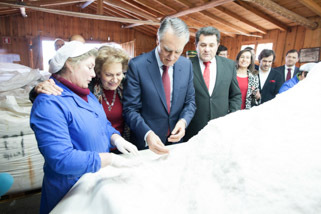
Honourable Chancellor
Honourable Minister for Culture
Honourable Mayor
Honourable Professors
In this my first visit to the University of Coimbra as President of the Republic I want first of all to greet, through Your Excellency, Honourable Chancellor, all the professors, students and staff of this institution who, through their knowledge and dedication, have known how to preserve the prestige of the Academy and provide an inestimable contribution to our Country.
Coimbra University was installed practically at the same time as the State of Portugal. From then on the University has been one of the stronger pillars of our identity, of our existence as a nation and of our international assertiveness.
In the campaign dedicated to historic and cultural heritage, such as that which I initiated this morning in the Church of Santa Cruz, it was essential that I should visit this institution, its history mingled with the history of Portugal and which continues as a dynamic centre for the production and dissemination of knowledge and culture.
Coimbra University is not just a reference of the Portuguese historic and cultural heritage: it is also an important landmark in the history of Europe. It was here, as well as in two or three other pioneering cities, that one of the institutions which mostly influenced the development of the European continent was created.
Without the university, European identity would certainly not be what it is today, nor would it have so decisively influenced the history of other continents. And Portugal, by installing what was then known as General Studies, was at the forefront of a Europe where knowledge would become the main factor for development and communication amongst peoples.
I am thus particularly pleased when becoming aware – through the speeches already delivered here by the Honourable Mayor and the Honourable Chancellor – of the projects that the University, together with the City Council, is developing for the refurbishment of its areas and for the presentation of an application to become World Heritage.
The important initiatives taken by the Coimbra City Council for the urban refurbishment of the historic centre, which were described to me, and must be encouraged, will certainly contribute for the recognition that the city deserves.
I hope the application will be successful, thus bringing greater visibility not only to the architectural quality of the site and of the chattels preserved here, but also to its implant in the geography and history of that other chattel, immaterial and indispensable, which is knowledge.
With the Route to Heritage, which I decided to undertake – the first campaign was held in Lower Alentejo – I have endeavoured to sensitize the various institutions, enterprises, and people in general, towards the relevance of this cause: the preservation of our identity as a Country, in its various projections.
I want to evince good practices, encourage the work for the recovery and defence of the heritage and to emphasize its role in the economic and social development of the Country.
I want to draw the attention of the younger people to our historic and cultural heritage and to make them liable for its preservation.
In a centre of knowledge and culture such as where we are now, it is unnecessary to justify the relevance of our heritage, whether historical, or as a factor for the identification and cohesion of our nation as a whole, or even as a decisive component for a sustainable local development.
We are all aware of the value and the symbolism of monuments such as the Church of Santa Cruz or the Sé Velha (Ancient Cathedral), which I visited this morning, as well as all the remaining sites which I will have the opportunity to see during this second campaign of the Route.
It is impossible to become really aware of how Portugal was born and bred, how borders were set and the land settled, how culture was consolidated and knowledge developed, if we do not attend to the vestiges which are still found in churches, monasteries and castles of this region, or in the walls of this university.
To preserve these signs of our past, or to bequest future generations with the tokens we have inherited, is not just an expression of recognition or patriotism: it is, above all, looking ahead and preparing a future based on what we really are and possess.
We are not just a sunny Country with natural landscapes much appreciated by those who visit us. We are also a Country with a secular culture, which must be listed, advertised and loved, in order that it is better preserved.
The University has a very special role to accomplish in all this work, together with all the remaining institutions directly involved in the cause of heritage. No one better than the university is able to sensitize those responsible, to research and disseminate the knowledge and techniques, which are nowadays required for the conservation and promotion of heritage.
I am fully certain the Portuguese university will accomplish this role with the dignity it deserves.
Together, we can and must put a stop to the abandonment and the decadence which threaten some of our more emblematic sites.
Portugal will only be a truly modern Country if it retains its memory.
© 2006-2016 Presidency of the Portuguese Republic
You have gained access to the records of the Official Site of the Presidency of the Republic from 9 March 2006 to 9 March 2016.
The contents available here were entered in the site during the 10 year period covering the two mandates of President of the Republic Aníbal Cavaco Silva.